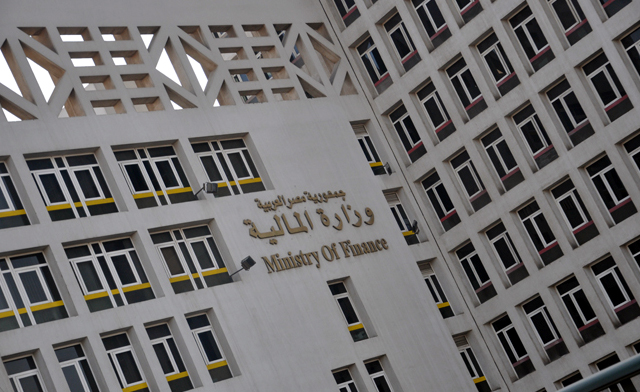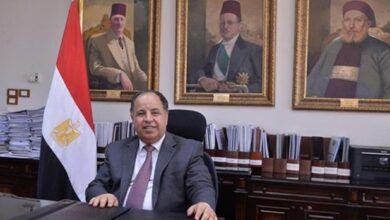Working in Egypt’s transitional government under the stewardship of the Supreme Council of the Armed Forces is no easy task, especially when you are charged with the government’s notoriously shambolic finances.
Knowing that his mandate was a part of a “national salvation government” that needed to respond to popular demands of the revolution, Hazem al-Beblawy, who was the finance minister and deputy prime minister, came in with an agenda to stave off a financial crisis by securing the government’s ailing finances while responding to demands for social justice by implementing a system of maximum and minimum wages.
During a tenure that lasted from 21 July to 21 November 2011, he was able to achieve a small fraction of what he set out to do amid political crises, national disasters and a governmental infrastructure that is as opaque as it is uncooperative.
In his new memoir published earlier this year, “Four Months in the Government’s Cage,” Beblawy reveals the difficulty of working within a cabinet unable or unwilling to take the kind of bold action a “revolutionary” government needs.
Beblawy defends his short-lived stint in government with a rundown of the major difficulties facing the economy and places many of his ministry’s shortcomings during that time period on the government’s inability to function during the transition.
“This government was perhaps unlucky. … It may have been unable to rise to the occasion but was pigeonholed into a reactionary posture,” he writes.
SCAF is not featured heavily in the book because Beblawy says his interaction with the council was not a regular part of his day-to-day role in government.
The lack of transparency and accountability was evidently a major stumbling block hindering then-Prime Minister Essam Sharaf’s government from providing a unified front at times when bold action was needed.
After the 9 October Maspero massacre, the cabinet had differing positions on whether the government should resign to protest SCAF’s handling of the incident. Beblawy eventually made an individual decision to hand in his resignation after other ministers backed down. In a rare conference with Field Marshal Hussein Tantawi and Armed Forces Chief of Staff Sami Anan, Beblawy’s resignation was flat-out refused.
“You are like a soldier in battle and cannot retreat when times are tough,” Beblawy says Tantawi told him. The minister returned to work the next day.
In fact, the only display of unity in Sharaf’s cabinet came when they finally decided to step down after nearly 40 protesters died in clashes with a combination of military and security forces. Even then, Beblawy says International Cooperation Minister Fayza Abouelnaga led calls within the cabinet against the resignations.
As the former finance minister and a veteran economist, Beblawy writes extensively about the economic and financial challenges facing the government and the difficulties he faced in attempting to tackle them. The Finance Ministry found it difficult to track down all sources of spending and revenue. Funds, as Beblawy explains it, seemed to just leak out of the government’s treasury untraceably because of an intricate system of inter-organizational debt and a system of providing “private funds” to local councils and governors to spend, largely without accountability.
To address the issue of social justice, and concurrently appease an expectant public, Beblawy chose to address the issue of wage disparity, especially among public sector workers, as his first priority. A month after taking office, he sent a memo to the prime minister recommending a new wage structure that would greatly limit the discrepancies between maximum and minimum wages. This would include all forms of income, because in his report, Beblawy notes that actual salaries only account for 20 percent of all public sector income. The other 80 percent is bundled in bonuses and incentives.
Cabinet members agreed to the measures “unenthusiastically,” Beblawy writes. Many ministers were resistant to having a transparent wage system.
“They feared transparency would increase resentment in the population,” he says.
After refusing to accept payment for a speaking engagement at the Petroleum Ministry, Beblawy reportedly faced the wrath of many of his peers. Even Tantawi called him.
“You mean to tell me you only want to take LE30,000?” Beblawy says the field marshal asked him.
Some ministers even showed their true colors regarding their desire to reform the wage system, which allowed high-ranking officials huge payments on top of their salaries. Beblawy tells of one unnamed minister — whom he describes as being “the most boisterous in his calls for social justice” — who sent a letter to Tantawi asking for a renewal of the dispensation of bonuses and incentives to ministers, as a response to Beblawy’s refusal to take fees for attending the meeting.
While Beblawy largely steers clear of personal score-settling in his account of the four months, he makes one exception: On 25 October, during a Finance Ministry press conference, Social Solidarity Ministry Gouda Abdel Khaleq and Beblawy argued publicly over government policy. Abdel Khaleq, known for his boisterous calls for social justice, criticized Beblawy’s policy of streamlining government spending and reliance on capital injections instead of increasing revenues through progressive taxes.
The former finance minister defended his hesitancy to join the tax system because such a decision “needs political backing,” which the government lacked.
“As a transitional government I didn’t want us to send the wrong signals in the political direction of the country,” Beblawy writes.
The Finance Ministry proposals to cut short-term spending focused mainly on decreasing energy subsidies, many of which went to industries, helping them record some of the highest profit margins in the world.
Besides decreasing spending, Beblawy sheds light on the reality behind many of the promises oil-rich countries made to Egypt for funding and found through his fundraising trips in the United Arab Emirates, France and Washington, that many of these promises would not be fulfilled.
“They all adopted a ‘wait and see’ strategy on whether or not they would fund Egypt,” the minister writes.
In one incident, after receiving verbal confirmation from UAE ministers of their intention to provide Egypt with around US$3.2 billion of investments, Beblawy said he heard from US Treasury Secretary Timothy Geithner that the UAE finance minister had reported they are “in no hurry to fulfill promises to Egypt.”
However, he seemed positive on the prospects of an International Monetary Fund injection. Between September 2010 and August 2011, Egypt’s foreign reserves decreased from $43 billion to $25 billion, which was the main reason behind Beblawy’s desire to cut spending and increase foreign funding. As a consummate believer in capitalism, much of Beblawy’s budgetary maneuvering was made while keeping in mind that the private sector and foreign investors must be reassured regarding the economic stability of Egypt.
Around a third of Beblawy’s book is composed of transcripts of memos, draft laws and proposals to the cabinet and SCAF. Yet despite the fact that he handed in proposals and memos, few of his ideas were implemented because there was no political will to push them through.
While showing respect for Sharaf and his government, Beblawy criticizes its lack of leadership.
However, Beblawy suggests the lack of communication between the government and SCAF created an inability to make strong decisions. The last straw for Beblawy and his peers was on 19 November. When SCAF decided to brutally clear Tahrir Square, killing at least eight people in its initial crackdown, it hadn’t informed the cabinet of the violent operation due to take place a few meters away from its headquarters. Then even the normally docile Sharaf could not hide his disappointment, Beblawy writes.
The cabinet resigned, some out of a sense of duty and others out of anger, while some, such as Fayza Abouelnaga, stayed on. Beblawy says Anan curiously phoned him, after the government’s resignation to ask if he would consider the post of prime minister. Beblawy refused.
While he provides a laundry list of his ministry’s accomplishments, they are mostly administrative. Beblawy was not able to accomplish anything that would have required the backing of a diligent, conscientious or reform-oriented president.




